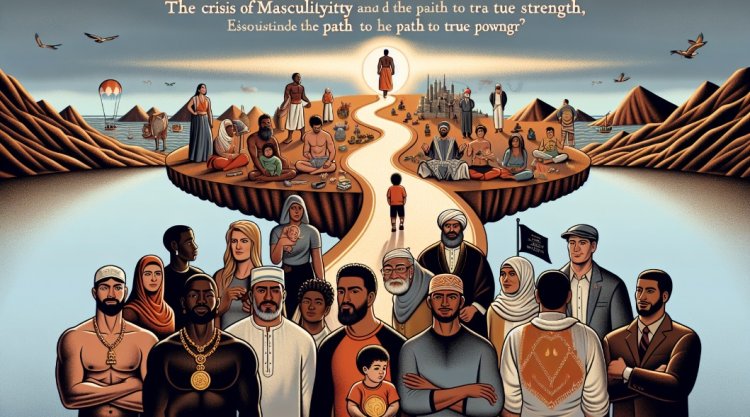Earning Power: The Crisis of Masculinity and the Path to True Strength
Redefining masculinity beyond earning power! Explore the complexities of the "crisis," discover alternative paths to strength, and build genuine confidence in a changing world.

Introduction
In today's society, there is a crisis of masculinity that needs to be addressed. Men are facing challenges when it comes to defining what true power means and how to attain it. The hero-making machine problem is prevalent, where men are not being properly equipped to handle the responsibilities of being strong and powerful. In this blog post, we will delve into the importance of true power, the crisis of masculinity, and the need for men to earn their power. By understanding these concepts, we can work towards creating a healthier and more balanced society.
The Current State of Men
When examining the current state of men, several key points come to light:
-
The increase in population but decrease in independence
-
The rise of single motherhood
-
Comparison to other cultures
-
The impact of fatherhood on boys
Firstly, the increase in population has led to a decrease in independence among men. In the past, fewer people were living alone, which often led to competition and personal growth. However, with the rise of single-person households, there is less pressure to push oneself and strive for personal success.
Secondly, single motherhood has become more prevalent in our society. From 1940 to today, the percentage of children born to a single mother has risen from 4% to 40%. This shift is concerning, as children often benefit from having both a mother and a father figure in their lives. Other cultures, such as China and India, have managed to maintain higher rates of two-parent households.
When comparing our culture to others, it becomes evident that we have moved away from the traditional family structure. In Middle Eastern and Muslim cultures, for example, there is a strong focus on keeping families together and maintaining traditional gender roles. While every culture has its own strengths and weaknesses, it is important to analyse and learn from different perspectives.
Lastly, the impact of fatherhood on boys cannot be ignored. Fathers provide unconditional love, mentorship, and discipline, which help shape a boy's character and values. Without a father figure, boys may lack these crucial elements, potentially leading to a lack of direction and purpose in their lives.
In conclusion, the current state of men is complex and multifaceted. While there are challenges, such as the decrease in independence and the rise of single motherhood, it is essential to recognise the importance of strong male role models and the impact they have on shaping boys into successful and well-rounded individuals.
The Elements of True Power
True power is not simply about physical strength or dominance. It goes much deeper than that. To truly possess power, one must cultivate three key elements: unconditional love, pain from someone you love, and the ability to choose wise enemies.
Unconditional love is the foundation of true power. It is the ability to love someone without conditions or expectations. This type of love allows for forgiveness, understanding, and compassion. When you can love unconditionally, you can create deep and meaningful connections with others.
Pain from someone you love is another element of true power. It is through pain that we learn and grow. When someone we love causes us pain, it forces us to confront our own vulnerabilities and weaknesses. This pain can lead to personal growth and a deeper understanding of ourselves and others.
Choosing wise enemies is also an important element of true power. Wise enemies are those who challenge us and push us to become better versions of ourselves. They are not enemies in the traditional sense, but rather individuals who inspire us to rise above our limitations and achieve our goals. By choosing wise enemies, we can develop resilience, determination, and a strong sense of purpose.
Examples of successful individuals who possess these elements of true power can be found throughout history. Leaders such as Winston Churchill, Nelson Mandela, and Martin Luther King Jr. demonstrated unconditional love, experienced pain from loved ones, and chose wise enemies in their respective struggles for justice and equality.
These elements of true power also have a significant impact on children. Children who are raised in an environment of unconditional love, who experience pain from loved ones, and who are taught to choose wise enemies are more likely to develop resilience, empathy, and a strong sense of self. These qualities can set them up for success in all aspects of life.
Fatherhood plays a crucial role in instilling these elements of true power in children. Fathers provide unconditional love, discipline, and guidance. They teach their children the importance of resilience, the value of healthy relationships, and the power of forgiveness. Through their presence and example, fathers can help shape their children into individuals who possess true power.
The Effects of Current Incentive Programmes
Current incentive programmes have had significant effects on family structure and societal contribution. The impact of welfare policies, in particular, has had a profound influence on the structure of families. These policies often provide financial assistance to single mothers, which can discourage the formation of traditional husband-and-wife partnerships. As a result, the number of single-mother households has increased significantly over the years.
While financial support for single mothers is important, it is essential to recognise the negative consequences of not rewarding husband-and-wife partnerships. Studies have shown that children raised in single-parent households, especially those without a father figure, can experience negative outcomes. These children may be more likely to face economic hardship, have lower educational attainment, and be at higher risk for behavioural and emotional problems.
Furthermore, family structure plays a crucial role in shaping a child's societal contribution. Children raised in stable, two-parent households tend to have better social and emotional development, higher educational attainment, and greater economic success. They are more likely to become productive members of society and contribute positively to their communities.
On the other hand, children raised without a father figure may face challenges in their development. Without the presence of a male role model, they may lack the guidance, discipline, and mentorship that are often provided by fathers. This can result in a lack of direction, low self-esteem, and a higher likelihood of engaging in risky behaviours.
In conclusion, current incentive programmes have had significant effects on family structure and societal contribution. The impact of welfare policies on family structure, the consequences of not rewarding husband-and-wife partnerships, the negative outcomes for children raised without fathers, and the relationship between family structure and societal contribution are all important factors to consider. It is crucial to find a balance between providing support for single mothers while also encouraging the formation of stable two-parent households to ensure the well-being and success of children and the betterment of society as a whole.
The Importance of Power and Aggression
In today's society, the perception of power has become skewed. Many view power as something negative, something to be avoided or rejected. However, it is important to redefine power and understand its true meaning.
Power is not simply about physical strength or dominance. It is about having control over one's own life and being able to make choices that align with one's values and goals. Power is the ability to influence and make an impact on the world.
There is a connection between power and aggression, but it is important to note that aggression does not always have to be negative. Aggression can be channelled in a productive way, such as through assertiveness and confidence. It is about standing up for oneself and pursuing what one believes in.
To achieve success, power plays a crucial role. Power gives individuals the ability to take action, make decisions, and overcome obstacles. It is the driving force behind ambition, determination, and resilience.
However, power should not be pursued for the sake of control or dominance. True power is about using one's influence and abilities to create positive change, to help others, and to make a difference in the world.
Society needs to redefine power and recognise its importance. Power should not be viewed as something negative, but rather as a tool for personal and societal growth. By productively embracing power and aggression, we can empower ourselves and others to achieve success and create a better world.
Defining a Real Man
When it comes to defining a real man, several key qualities come to mind. Firstly, a real man possesses strength, both physically and mentally. This strength allows him to navigate life's challenges and overcome obstacles with resilience.
In addition to strength, a real man is self-disciplined. He can control his impulses and make wise choices that align with his values and goals. This self-discipline allows him to stay focused and determined, even in the face of adversity.
One of the most important characteristics of a real man is the ability to find a balance between aggression and control. While aggression can be a powerful tool, it must be channeled productively and assertively. A real man knows when to assert himself and when to exercise restraint, finding the delicate balance between strength and control.
A real man's role extends beyond his personal life. In different areas of life, such as relationships, work, and society, a real man is a positive influence. He is a leader who inspires others, stands up for what is right, and makes a difference in the world.
In relationships, a real man is a supportive partner. He provides unconditional love, respect, and protection to his significant other. He understands the importance of emotional intelligence and effective communication.
In the workplace, a real man is a reliable and responsible colleague. He takes ownership of his work, demonstrates professionalism, and leads by example. He is not afraid to take on challenges and strives for excellence in his professional endeavours.
In society, a real man is an active and engaged citizen. He understands his role in creating a better world and works towards making a positive impact. Whether it's through volunteering, advocacy, or leadership positions, a real man contributes to the betterment of society.
In conclusion, a real man possesses qualities such as strength, self-discipline, balance between aggression and control, and a sense of responsibility in various areas of life. By embodying these qualities, a real man can lead a fulfilling and purposeful life, making a positive impact on himself and those around him.
The Necessity of Earning
In today's society, earning respect and authority is crucial for personal growth and success. The value of earning respect and authority cannot be underestimated. When you work hard to earn the respect and authority of others, it establishes your credibility and influence. It shows that you have the skills, knowledge, and character to be trusted and relied upon.
When you earn respect and authority, you also gain a sense of self-worth and confidence. Knowing that you have earned your position and the respect of others gives you a sense of pride and accomplishment. It motivates you to continue working hard and striving for even greater success.
Earning respect and authority also plays a crucial role in personal growth. When you work hard to earn respect and authority, you are constantly challenging yourself and pushing your limits. This leads to personal growth and development. As you overcome obstacles and achieve success, you learn valuable lessons and develop new skills.
In addition to personal growth, earning respect and authority is also important for the betterment of society. In a society where entitlement is prevalent, it is crucial to promote the value of earning. By promoting earning, we encourage individuals to work hard, be accountable, and contribute positively to society.
Furthermore, earning respect and authority helps maintain balance in society. When individuals are rewarded based on their merits and contributions, it creates a fair and just environment. It prevents entitlement and helps foster a sense of responsibility and accountability.
In conclusion, earning respect and authority is necessary for personal growth, societal betterment, and maintaining balance. By valuing earning over entitlement, we can promote a culture of hard work, accountability, and success. It is through earning that we can truly reach our full potential and make a positive impact on the world.
The Role of Discipline and Effective Leadership
Discipline and effective leadership play crucial roles in shaping individuals and achieving goals. Here are some key points to consider:
-
The Importance of Discipline in Achieving Goals: Discipline is essential for staying focused, motivated, and committed to your goals. It helps you overcome obstacles, develop self-control, and maintain consistency in your actions. Without discipline, it's easy to veer off track and lose sight of what you're working towards.
-
The Role of Effective Leadership in Shaping Individuals: Effective leaders can inspire, motivate, and guide individuals towards success. They provide support, mentorship, and direction, helping individuals reach their full potential. Through their leadership, they instill important values such as resilience, determination, and integrity.
-
Examples of Effective Leaders and Their Impact on Society: Throughout history, there have been many examples of effective leaders who have made a significant impact on society. Leaders like Winston Churchill, Nelson Mandela, and Martin Luther King Jr. demonstrated strong leadership qualities and fought for justice and equality. Their leadership inspired millions of people and brought about transformative change.
-
Balancing Discipline and Motivation: While discipline is important for achieving goals, it's equally important to find balance with motivation. Discipline provides the structure and consistency needed to stay on track, while motivation fuels passion and enthusiasm. It's important to find a balance between the two, as too much discipline without motivation can lead to burnout, and too much motivation without discipline can result in a lack of focus and direction.
Overall, discipline and effective leadership are essential for personal growth, achieving goals, and making a positive impact on society. By cultivating discipline, embracing effective leadership qualities, and finding a balance between discipline and motivation, individuals can unlock their true potential and create a better world.
Conclusion
In today's world, it's super important for men to find real power and strength. Today, men often don't know what true power really means. They need to understand that power isn't about bossing others around or being tough. Real power comes from things like boundless love, the ability to deal with pain, and knowing who is worth your time and energy.
To gain this true strength, it's important to realise what it means to be a man and get respect. Guys should realise that power isn't bad at its core. Rather, it can be very useful for growing as a person and making the world a better place. When men use their own power smartly and courageously, they can live a great life and do good for themselves and others.
Being a world-class leader is extremely important to creating a society that works well together. True leaders can motivate individuals to take a stand for what is just and contribute to the betterment of our world, and having strong leaders is crucial in various aspects of life, including personal relationships, work, and the world at large.
It's time to make a move, shake up the idea of masculinity, and promote real power. Men can completely change the game by choosing to be strong, self-possessed, balanced, and in charge. By living out these traits, men can lead the way to a stronger and cooler society.
Ultimately, men need to find their true strength and toughness. By changing what it means to be masculine, harnessing their true power, and being solid leaders, men can truly make their mark on themselves, their community, and the world.



 admin
admin 










